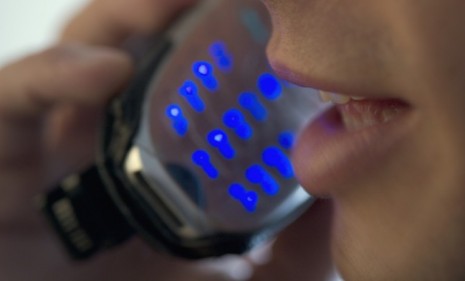Are you allergic to your cellphone?
More and more people are developing an allergy to a metal in their cellphones' buttons. Here's a quick briefing on this disturbing discovery

A free daily email with the biggest news stories of the day – and the best features from TheWeek.com
You are now subscribed
Your newsletter sign-up was successful
If you have red, itchy patches on your cheeks, prepare to be paranoid: According to a new theory, you might be allergic to your cellphone. Researchers have discovered that a growing number of people are developing a nickel allergy that can be provoked by cellphone use. Here, a quick instant guide to the phenomenon:
What kind of symptoms should I be looking for?
A rash or skin lesions on your cheek, jawline, and ears. In severe cases, oozing and scarring also occur.
The Week
Escape your echo chamber. Get the facts behind the news, plus analysis from multiple perspectives.

Sign up for The Week's Free Newsletters
From our morning news briefing to a weekly Good News Newsletter, get the best of The Week delivered directly to your inbox.
From our morning news briefing to a weekly Good News Newsletter, get the best of The Week delivered directly to your inbox.
I have that! What's wrong with me?
You may be allergic to nickel, the mineral used in most cellphones' buttons. Approximately 17 percent of women and 3 percent of men are affected, says Dr. Luz Fonacier, a dermatologist at the Winthrop University Hospital in Mineola, N.Y., who presented her findings at a recent meeting of the American College of Allergy, Asthma, and Immunology.
How would I develop an allergy to nickel?
Prolonged exposure. While long hours spent pressing a cellphone to your face could be a factor, a more common trigger is the wearing of cheap jewelry. Girls who pierce their ears before age 10 are at high risk of developing sensitivity to the mineral, says Dr. Fonacier. The pigments used in temporary tattoos can also cause similar allergic reactions.
A free daily email with the biggest news stories of the day – and the best features from TheWeek.com
What can worried cellphone users do?
Buy a hands-free device or a phone cover to prevent contact with the nickel-laden keys, suggests Dr. Clifford W. Bassett at Fox News. "Utilize the speaker phone option, whenever possible," he adds.
Why are people developing these allergies now?
Now that we live in "cleaner, safer, more disease-free environments," says Kate Dailey at Newsweek, our immune system has less to do and ends up turning on "substances once considered safe." Furthermore, children are being exposed to "foreign substances" at earlier ages. "It's all just another reason to keep those cell phones and temporary tats away from young hands."
Sources: Newsweek, Fox News, Consumer Reports, Science Daily